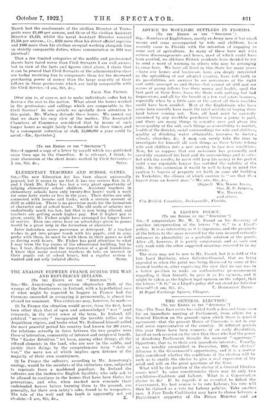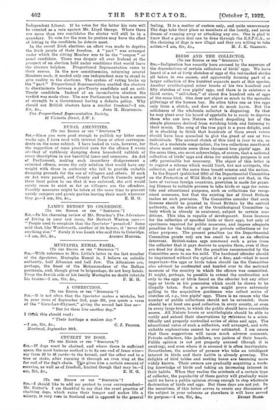THE GENERAL ELECTION?
[To THE EDITOR CF THE " SPECTATOR."1 SIE,—The Near East crisis has called forth a demand from some for an immediate meeting of Parliament, from others for a General Election on the ground—upon which there is general agreement—that the present House of Commons is not ill any real sense representative of the country. At different periods this year there have been rumours of an early dissolution, based on each occasion on the view that those who had the power of dissolving Parliament thought the moment " opportune.— Opportune, that is, to their own immediate interests. Usually, as was notably exemplified in December, 1918, the electors' dilemma is the Government's opportunity, and it is a matter little considered whether the conditions of the election will be such as to enable the elector to give a real expression of his mind and will on the great questions of the time.
'What will be the position of the elector if a General Election comes now? In soine constituencies there may be only two candidates—Coalition and Labour. What is a Conservative elector to do? If be regards it as essential to defeat the Government, his best course is to vote Labour; his vote will then be claimed as a vote for Labour policies. 'rake another case. I Free Trade Coalitionist may have to choose between a Protectionist supporter of the Prime Minister and an
Independent Liberal. If he votes for the latter his vote will be counted as a vote against Mr. Lloyd George. Where there are more than two candidates the elector will still be in a quandary. To vote for the man he prefers may have the effect of letting in the candidate he detests most.
In the recent Irish elections an effort was made to deprive the Irish people of their freedom. A " pact " was arranged under which the sitting Member was to be the "coupon or panel candidate. There was despair all over Ireland at the prospect of an election held under oonditions that would leave the electors helpless. Proportional Representation came to their rescue. In the new constituencies, returning several Members each, it needed only one independent man to stand to give reality to the elections. The system of voting broke up the "pact." Proportional Representation enabled the electors to discriminate between a pro-Treaty candidate and an anti- Treaty candidate. Instead of an inconclusive election the verdict was made clear. The new Parliament has been a source' of strength to a Government having a definite policy. Why should not British electors have a similar freedom?—I am.







































 Previous page
Previous page